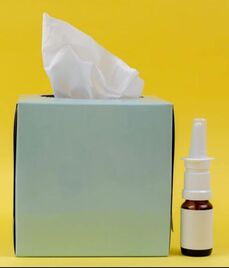Laurie Anne Walden, DVM  Over-the-counter (nonprescription) nasal sprays and eye drops can pose a serious risk to animals that ingest them. The problem ingredients—imidazoline decongestants, phenylephrine, and xylitol—are common in products to treat allergies, colds, flu, and red eyes. If your pet chews a nasal spray or eye drop bottle, call your veterinarian or an animal poison control hotline immediately. This type of poisoning is a medical emergency. Even small amounts of ingested product can be dangerous. Pet poison hotlines (consultation fees apply):
Imidazoline Decongestants Decongestants in the imidazoline class are found in many nasal sprays and eye drops that reduce nasal congestion and eye redness. Some of the drugs in this group are oxymetazoline, naphazoline, tetrahydrozoline, tolazoline, and xylometazoline. A few of the many brands that contain imidazolines are Afrin, Clear Eyes, Mucinex, Opcon, Privine, Sinex, Visine, and Zicam. Imidazolines affect the heart, circulation, digestive system, and nervous system. They decrease nasal congestion and eye redness by narrowing small blood vessels in the nose and eyes. Symptoms of imidazoline poisoning appear as soon as 15 minutes after ingestion of a large amount or a few hours after ingestion of a small amount. The symptoms last from about 12 to 36 hours and include the following:
Animals with imidazoline poisoning need to be hospitalized for treatment and monitoring. Reversal agents for imidazolines are available. Phenylephrine Imidazolines and phenylephrine have similar effects on the body. Like imidazolines, phenylephrine acts as a decongestant by shrinking small blood vessels in the nose. Phenylephrine is available in oral forms, nasal sprays, eye drops, and hemorrhoid creams. Two brands of nasal spray that contain phenylephrine are Little Remedies and Neo-Synephrine. Ingestion can cause vomiting, agitation, hyperactivity, and increased blood pressure.[2] Xylitol Some nasal sprays, including some with labels reading “natural saline,” contain xylitol. One example is Xlear nasal spray. Xylitol is harmless in humans, but in dogs it causes a dangerous, rapid drop in blood sugar and can also cause liver damage. The best approach is to keep all remedies (prescription, nonprescription, and “natural”) out of reach of pets and never assume that a product that’s safe for children is also safe for animals. References 1. Almgren C. Clear eyes, dry nose, no problem? Wrong! Intoxications due to eye drops and nasal sprays. Pet Poison Helpline webinar. November 14, 2017. Accessed March 21, 2021. https://www.petpoisonhelpline.com/webinar/november-2017-intoxications-due-eye-drops-nasal-sprays/ 2. Khan SA. Decongestants (toxicity). Merck Veterinary Manual. Updated August 2014. Accessed March 21, 2021. https://www.merckvetmanual.com/toxicology/toxicities-from-human-drugs/decongestants-toxicity Photo by Diana Polekhina Comments are closed.
|
AuthorLaurie Anne Walden, DVM Categories
All
Archives
June 2024
The contents of this blog are for information only and should not substitute for advice from a veterinarian who has examined the animal. All blog content is copyrighted by Mallard Creek Animal Hospital and may not be copied, reproduced, transmitted, or distributed without permission.
|
- Home
- About
- Our Services
- Our Team
-
Client Education Center
- AKC: Spaying and Neutering your Puppy
- Animal Poison Control
- ASPCA Poisonous Plants
- AVMA: Spaying and Neutering your pet
- Biting Puppies
- Boarding Your Dog
- Caring for the Senior Cat
- Cats and Claws
- FDA warning - Bone treats
- Force Free Alliance of Charlotte Trainers
- Getting your Cat to the Vet - AAFP
- Holiday Hazards
- How To Feed Cats for Good Health
- How to Get the Most Out of your Annual Exam
- Indoor Cat Initiative - OSU
- Introducing Your Dog to Your Baby
- Moving Your Cat to a New Home
- Muzzle Training
- Osteoarthritis Checklist for Cats
- What To Do When You Find a Stray
- Our Online Store
- Dr. Walden's Blog
- Client Center
- Contact
- Cat Enrichment Month 2024
|
Office Hours
Monday through Friday 7:30 am to 6:00 pm
|
Mallard Creek Animal Hospital
2110 Ben Craig Dr. Suite 100
|
Site powered by Weebly. Managed by IDEXX Laboratories

 RSS Feed
RSS Feed